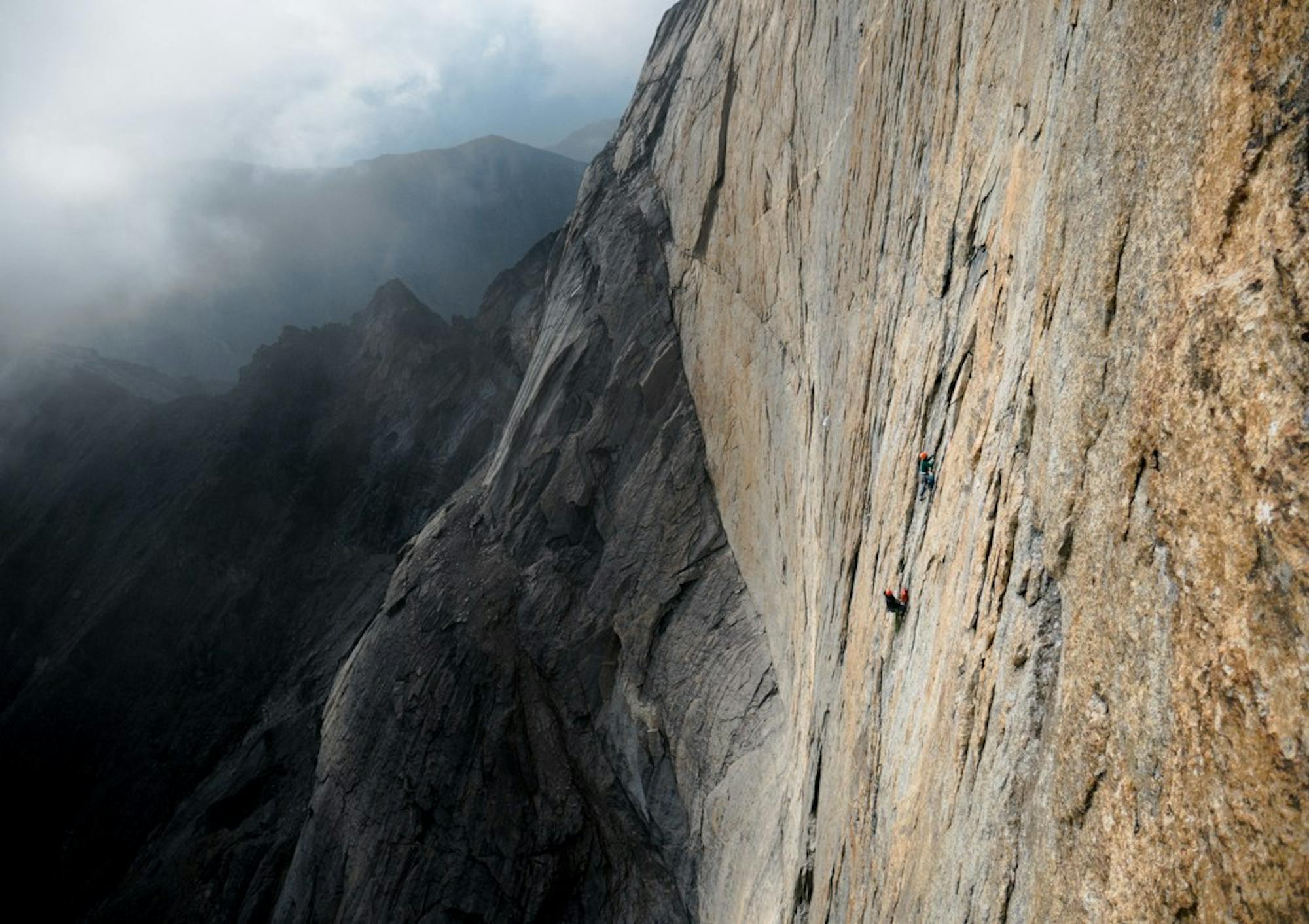Last July, four Dartmouth students made a historic first ascent of Mount Xanadu’s western wall in the Arrigetch Peaks region of Alaska. It took David Bain ’17, Billy Braasch Gr’19, Gabriel Boning ’18 and Zebediah Engberg A&S’11 A&S’14 nearly one month to scale the approximately 1,600-foot wall, but they will remember the experience for a lifetime, Boning said.
The first person to ascend Xanadu was Jon Krakauer, the author of “Into the Wild,” who made the climb in 1974 through the lower west face of the mountain’s ridge. Until last summer, the peak had remained virtually untouched. The route that the students climbed consisted of 14 sections, many of which were highly technical. The team named the route “Golden Petals” and received a personal congratulations from Krakauer on Instagram.
The inspiration behind climbing Xanadu, Braasch said, was to honor late student Christopher Vale ’18, a close friend of theirs who unexpectedly passed away in September 2016 while climbing in Yosemite National Park.
“I felt like [Vale] was somebody who dreamed big and made these types of things happen … climbing Xanadu felt like a meaningful way to honor his legacy,” Braasch said.
Engberg echoed this sentiment.
“This trip grew around [Vale’s] memory and it became a trip in celebration of Chris,” he said.
The trip was funded partially by the Dartmouth Outing Club’s Chris Vale Expedition Fund and by the Copp-Dash Inspire Award from the American Alpine Club.
The first step of the journey started in Hanover, where the group meticulously planned their itinerary and the foods they would take, Braasch and Engberg said. What took the most time was identifying calorie-dense foods that wouldn’t weigh the group down during the climb, Engberg explained. After calculating the calories per gram in various food items in a Microsoft Excel spreadsheet, they eventually decided to include pasta, grains, cheese, nuts and chocolates in their food packs. Factoring in the weight of their climbing gear, each of the four men carried about 85 pounds on their backs.
Then, to get to Xanadu, the group took a series of flights before arriving in Gates of the Arctic National Park and Preserve, landing on a lake 20 miles away from the base of the mountain, where they intended to camp, said Braasch.
“It was sort of a Russian doll airplane experience,” Braasch said, referring to the progressively smaller planes the four climbers boarded at each leg of their trip.
The hike to the base of the mountain consisted of around 16 miles and 5,000 feet of elevation gain.
Braasch recalled that when the group arrived at the mountain’s base, they communicated with his wife via satellite messenger and learned that weather forecasts called for three days of rainfall. As a result, the group was forced to delay their ascent for an entire week, he said.
“Weather is actually a major reason why no one has ever climbed this wall before,” Braasch added.
After climbing at a fast pace for six days, the group had to pause once again because of rain, according to Engberg. However, the most difficult part of their trip came when Braasch made an error while attempting a technical climbing maneuver and took an unexpected fall, or “whipper,” he said.
“[Braasch] took a big pendulum swing across the face of the wall,” Engberg said. “He didn’t hit anything, but it could have been bad if the circumstances were different.”
The group encountered an unexpected challenge when they realized that they didn’t bring enough dinners to last them the whole trip, according to Braasch. As a result, they avoided eating lunch and ate half-dinners for a few days, he said. Engberg also identified their food shortage as one of the hardest parts of the climb.
“By the end of the trip we were all fairly hungry,” he said.
However, Braasch noted that not all of the surprises that sprung up during the trip were negative. During their climb, they ran into professional Catalan alpinist Sílvia Vidal, who was attempting an ascent of Xanadu’s western wall entirely on her own.
“We were doing something that was otherworldly to us, and to see her doing the same thing alone was so cool and inspiring, Braasch said.
The four climbers were also pleasantly surprised by the quality of Xanadu’s rock wall. Its steepness and number of footholds rendered it “right in our wheelhouse,” Braasch said.
Boning agreed that Xanadu’s western wall was of especially high quality.
“Since it’s rock that no one’s ever touched before, we didn’t know whether it was going to be solid or break off … it turned out to be pretty solid rock and had a really good movement to it,” he said.
Braasch said that some sections of the wall, including its first 60 feet, were especially difficult to climb with the weight of their gear on their backs. However, he enjoyed the opportunity to challenge himself.
“In a way, that’s what we [went] there for,” he said.
Though the four men have already made history in Alaska, they intend to continue pushing their limits as climbers in the future. Boning said that he will take advantage of climbing opportunities in Seattle, where he will live after graduating from the College this spring. Engberg hopes to climb unexplored areas of Yukon, Canada. Braasch, however, wants nothing more than to relive his experiences in Xanadu and its surrounding areas.
“I feel like I have a special connection to the Arrigetch,” he said.




